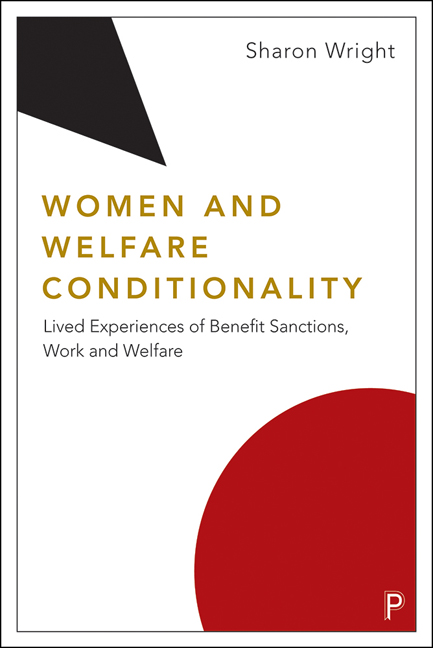Book contents
- Frontmatter
- Contents
- List of figure, tables and charts
- List of abbreviations
- Acknowledgements
- one What does work-based welfare reform mean for women?
- two Re-theorising conditional welfare as gendered lived experience and street-level practice
- three Policy context: the hidden gendered impacts of conditional welfare reforms
- four Rewriting retirement as ‘work experience’: older women’s gendered encounters with the work ethic
- five Crushing conditionality: women living through heavily enforced work-related conditionality
- six In the shadow of sanctions: disciplining women and children for violating male-defined work norms
- seven Conclusions
- Appendix 1 The Welfare Conditionality study
- Appendix 2 Sanctions overviews
- Notes
- References
- Index
two - Re-theorising conditional welfare as gendered lived experience and street-level practice
Published online by Cambridge University Press: 27 March 2024
- Frontmatter
- Contents
- List of figure, tables and charts
- List of abbreviations
- Acknowledgements
- one What does work-based welfare reform mean for women?
- two Re-theorising conditional welfare as gendered lived experience and street-level practice
- three Policy context: the hidden gendered impacts of conditional welfare reforms
- four Rewriting retirement as ‘work experience’: older women’s gendered encounters with the work ethic
- five Crushing conditionality: women living through heavily enforced work-related conditionality
- six In the shadow of sanctions: disciplining women and children for violating male-defined work norms
- seven Conclusions
- Appendix 1 The Welfare Conditionality study
- Appendix 2 Sanctions overviews
- Notes
- References
- Index
Summary
Bridget is living a “nightmare”. She is 36 years old, White British and lives with her 18-year-old son. She left her stressful social care management job three years ago, for her “own sanity”, after being bullied. She spun “into a complete and utter downward spiral”. Unable to work she withdrew “from everyone”. Without any income, she used a credit card to pay her mortgage. ‘I bought right at the height of the housing price, and my dad had given me a big deposit, so even with that I’m still in negative equity, so I was kind of stuck in the house.’ Bridget stopped opening her post. The debts mounted up. With severe depression and on the brink of eviction, a friend and former colleague stepped in. Bridget’s mortgage provider suggested applying for benefits. At the medical assessment, Bridget was deemed ‘fit to work’, despite her debilitating mental health condition. She qualified for Employment and Support Allowance (ESA) but was put in the Work-Related Activity Group instead of the Support Group. This meant she was required to do regular work-related activities. The Work Programme was “just horrendous” and heaped “sanction upon sanction upon sanction upon sanction” for missing appointments that she knew nothing about.
“Long periods of time … without money” felt “impossible”. Being sanctioned nearly every month for a year “delayed my recovery and it exacerbated a situation that was already at a breaking point of going further and further into a black hole”. At Bridget’s “lowest point” she was reassessed. This time she was placed appropriately in the ESA Support Group, without any work-related conditionality, which put an end to “catastrophe after catastrophe”.
Freed from conditionality, Bridget “instantly had relief ”. She started to recover, changed medication and got counselling support. Then she took on “a real battle” to successfully appeal her original Work Capability Assessment outcome and got a small pot of backdated benefits. She appealed her sanctions. Bridget started doing voluntary support work a few hours a week as ‘permitted work’. Over the next year, a local support agency “helped me get back into my normal, full-time professional job”. Another year later, Bridget passed her six-month probation period as a full-time social worker. She is “still struggling a bit” with her mental health but “definitely better off financially”. She is looking forward to a surfing holiday for her son’s 21st birthday.
- Type
- Chapter
- Information
- Women and Welfare ConditionalityLived Experiences of Benefit Sanctions, Work and Welfare, pp. 16 - 38Publisher: Bristol University PressPrint publication year: 2023

